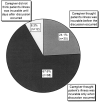Communication between physicians and family caregivers about care at the end of life: when do discussions occur and what is said?
- PMID: 16351531
- PMCID: PMC1459281
- DOI: 10.1089/jpm.2005.8.1176
Communication between physicians and family caregivers about care at the end of life: when do discussions occur and what is said?
Abstract
Background: Few studies have examined physician-family caregiver communication at the end of life, despite the important role families have in end-of-life care decisions. We examined family caregiver reports of physician communication about incurable illness, life expectancy, and hospice; the timing of these discussions; and subsequent family understanding of these issues.
Design: Mixed methods study using a closed-ended survey of 206 family caregivers and open-ended, in-depth interviews with 12 additional family caregivers.
Setting/subjects: Two hundred eighteen primary family caregivers of patients with cancer enrolled with hospice between October 1999 and June 2002.
Measurements: Family caregiver reports provided at the time of hospice enrollment of physician discussions of incurable illness, life expectancy, and hospice.
Results: Many family caregivers reported that a physician never told them the patient's illness could not be cured (20.8%), never provided life expectancy (40% of those reportedly told illness was incurable), and never discussed using hospice (32.2%). Caregivers reported the first discussion of the illness being incurable and of hospice as a possibility occurred within 1 month of the patient's death in many cases (23.5% and 41.1%, respectively). In open-ended interviews, however, family caregivers expressed ambivalence about what they wanted to know, and their difficulty comprehending and accepting "bad news" was apparent in both qualitative and quantitative data.
Conclusion: Our findings suggest that ineffective communication about end-of-life issues likely results from both physician's lack of discussion and family caregiver's difficulty hearing the news. Future studies should examine strategies for optimal physician-family caregiver communication about incurable illness, so that families and patients can begin the physical, emotional, and spiritual work that can lead to acceptance of the irreversible condition.
Figures




References
-
- Hanson L, Danis M, Garret J. What is wrong with end-of life care—Opinions of bereaved family members. J Am Geriatr Soc. 1997;45:1339–1344. - PubMed
-
- Institute of Medicine . Approaching Death: Improving Care at the End of Life. National Academy Press; Washington, D.C.: 1997.
-
- Lynn J. Measuring quality of care at the end of life— A statement of principles. J Am Geriatr Soc. 1997;45:526–527. - PubMed
-
- Bradley EH, Fried TF, Kasl SV, Idler EL. Quality-of-life trajectories. In: Lawton MP, editor. Annual Review of Gerontology and Geriatrics. Vol. 20. Springer; New York: 2000. pp. 64–96.
-
- Singer PA, Martin DK, Kelner M. Quality end-of-life care: Patients’ perspectives. JAMA. 1999;281:163–168. - PubMed
Publication types
MeSH terms
Grants and funding
LinkOut - more resources
Full Text Sources
Medical
Research Materials

